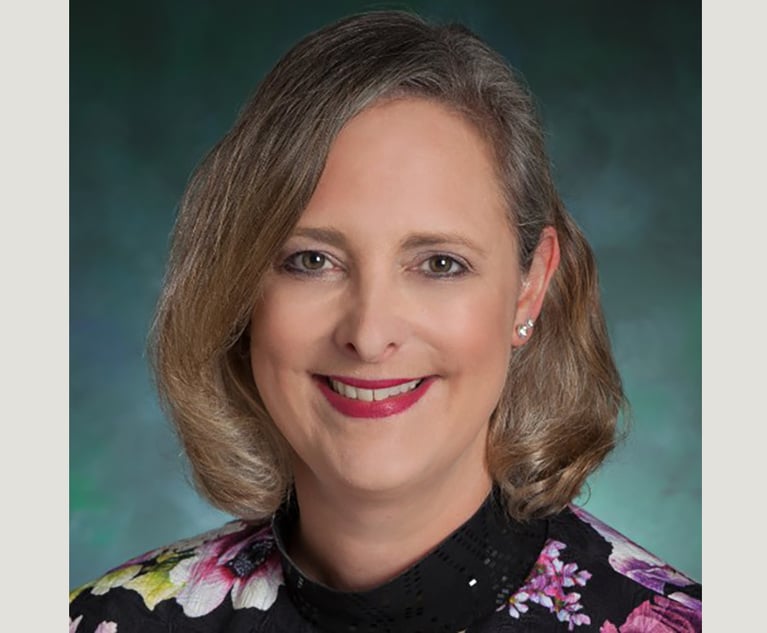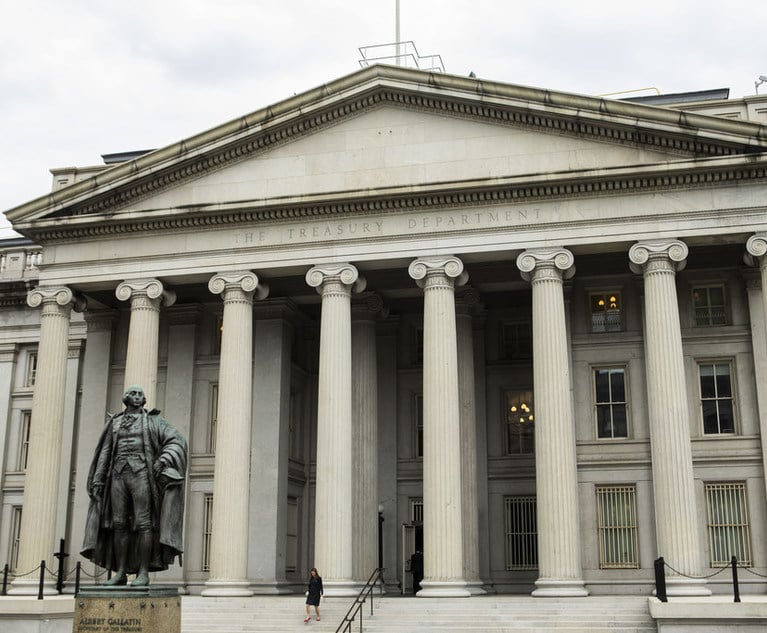Licensing and Mergers Halt With FCC Shutdown
License approval is at a standstill and the 180-day clock on mergers also has been paused, said Laura Phillips, a telecommunications lawyer and partner at Drinker Biddle & Reath in Washington, D.C., and chair of the firm's government and regulatory affairs practice group.
January 03, 2019 at 05:55 PM
3 minute read
 Laura Phillips, partner at Drinker Biddle & Reath in Washington, D.C.
Laura Phillips, partner at Drinker Biddle & Reath in Washington, D.C.
The Federal Communications Commission announced Thursday that it is shuttering a majority of its operations during the partial federal government shutdown, and companies that are waiting on FCC approval for license applications will be delayed indefinitely, both by the shutdown and the backlog that will inevitably result.
The 180-day clock on mergers also has been paused, putting the T-Mobile/Sprint merger on hold as well, said Laura Phillips, a telecommunications lawyer and partner at Drinker Biddle & Reath in Washington, D.C., and chair of the firm's government and regulatory affairs practice group.
Phillips said that approximately 1,200 employees have been furloughed and the agency would continue operating with a minimum staff, which includes its chairman and commissioners. “There isn't a lot [that] the commissioners sitting on the eighth floor of the FCC building can do,” she said.
Phillips said the biggest issue for many companies will be licensing applications.
“For companies with projects that rely on FCC licensing, it will have a very immediate effect on their business,” she said.
Companies faced with an emergency, such as if a radio tower were knocked over by a tornado, would be able to get emergency help. But companies in the process of opening a new radio station, on the other hand, will have to wait to apply for their license.
When the FCC is fully operational, something like an application for a private radio license, assuming there are no irregularities, would normally take the FCC about a week to review and approve. Now, Phillips said, there is no telling on what kind of backlog FCC employees will have once they get back to work.
She also said that by shuttering its doors, the mergers clock has been paused, and that means that the T-Mobile/Sprint merger has been put on hold.
“T-Mobile is not happy,” she said.
She explained that the FCC has an informal “shot clock” of 180 days to consider and decide on a merger.
Phillips said that during the 2013 shutdown, the FCC's website's search function was taken offline and practitioners weren't able to look up historical documents.
“As a practitioner, it was a relief to see that a lot of historical documents are still online,” Phillips explained. “Now you have free time to do that deep dive and get yourself prepared for the next big thing.”
The shutdown has been ongoing since 12:01 a.m. Dec. 22, and according to the Washington Post, has been the longest shutdown since the partial shutdown of the federal government in 2013.
Read more:
Employers Won't Feel as Much of a Sting From This Shutdown, Firm Says
Federal Trade Agencies Not Immune From Shutdown: Law Firm
FCC To Close Doors On Thursday If Partial Shutdown Continues
Shutdown Weighs Heavily On Federal Employees
This content has been archived. It is available through our partners, LexisNexis® and Bloomberg Law.
To view this content, please continue to their sites.
Not a Lexis Subscriber?
Subscribe Now
Not a Bloomberg Law Subscriber?
Subscribe Now
NOT FOR REPRINT
© 2025 ALM Global, LLC, All Rights Reserved. Request academic re-use from www.copyright.com. All other uses, submit a request to [email protected]. For more information visit Asset & Logo Licensing.
You Might Like
View All
Netflix Music Guru Becomes First GC of Startup Helping Independent Artists Monetize Catalogs
2 minute read

Global Software Firm Trying to Jump-Start Growth Hands CLO Post to 3-Time Legal Chief

Supreme Court Reinstates Corporate Disclosure Law Pending Challenge
Trending Stories
- 1New York-Based Skadden Team Joins White & Case Group in Mexico City for Citigroup Demerger
- 2No Two Wildfires Alike: Lawyers Take Different Legal Strategies in California
- 3Poop-Themed Dog Toy OK as Parody, but Still Tarnished Jack Daniel’s Brand, Court Says
- 4Meet the New President of NY's Association of Trial Court Jurists
- 5Lawyers' Phones Are Ringing: What Should Employers Do If ICE Raids Their Business?
Who Got The Work
J. Brugh Lower of Gibbons has entered an appearance for industrial equipment supplier Devco Corporation in a pending trademark infringement lawsuit. The suit, accusing the defendant of selling knock-off Graco products, was filed Dec. 18 in New Jersey District Court by Rivkin Radler on behalf of Graco Inc. and Graco Minnesota. The case, assigned to U.S. District Judge Zahid N. Quraishi, is 3:24-cv-11294, Graco Inc. et al v. Devco Corporation.
Who Got The Work
Rebecca Maller-Stein and Kent A. Yalowitz of Arnold & Porter Kaye Scholer have entered their appearances for Hanaco Venture Capital and its executives, Lior Prosor and David Frankel, in a pending securities lawsuit. The action, filed on Dec. 24 in New York Southern District Court by Zell, Aron & Co. on behalf of Goldeneye Advisors, accuses the defendants of negligently and fraudulently managing the plaintiff's $1 million investment. The case, assigned to U.S. District Judge Vernon S. Broderick, is 1:24-cv-09918, Goldeneye Advisors, LLC v. Hanaco Venture Capital, Ltd. et al.
Who Got The Work
Attorneys from A&O Shearman has stepped in as defense counsel for Toronto-Dominion Bank and other defendants in a pending securities class action. The suit, filed Dec. 11 in New York Southern District Court by Bleichmar Fonti & Auld, accuses the defendants of concealing the bank's 'pervasive' deficiencies in regards to its compliance with the Bank Secrecy Act and the quality of its anti-money laundering controls. The case, assigned to U.S. District Judge Arun Subramanian, is 1:24-cv-09445, Gonzalez v. The Toronto-Dominion Bank et al.
Who Got The Work
Crown Castle International, a Pennsylvania company providing shared communications infrastructure, has turned to Luke D. Wolf of Gordon Rees Scully Mansukhani to fend off a pending breach-of-contract lawsuit. The court action, filed Nov. 25 in Michigan Eastern District Court by Hooper Hathaway PC on behalf of The Town Residences LLC, accuses Crown Castle of failing to transfer approximately $30,000 in utility payments from T-Mobile in breach of a roof-top lease and assignment agreement. The case, assigned to U.S. District Judge Susan K. Declercq, is 2:24-cv-13131, The Town Residences LLC v. T-Mobile US, Inc. et al.
Who Got The Work
Wilfred P. Coronato and Daniel M. Schwartz of McCarter & English have stepped in as defense counsel to Electrolux Home Products Inc. in a pending product liability lawsuit. The court action, filed Nov. 26 in New York Eastern District Court by Poulos Lopiccolo PC and Nagel Rice LLP on behalf of David Stern, alleges that the defendant's refrigerators’ drawers and shelving repeatedly break and fall apart within months after purchase. The case, assigned to U.S. District Judge Joan M. Azrack, is 2:24-cv-08204, Stern v. Electrolux Home Products, Inc.
Featured Firms
Law Offices of Gary Martin Hays & Associates, P.C.
(470) 294-1674
Law Offices of Mark E. Salomone
(857) 444-6468
Smith & Hassler
(713) 739-1250






